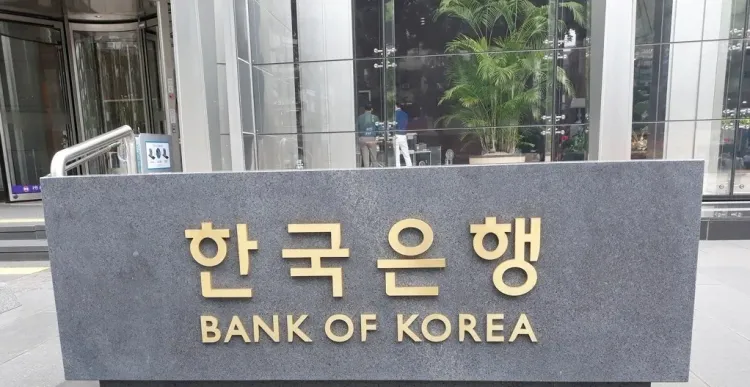Why Did South Korea's Money Supply Decline for the First Time in 23 Months?

Synopsis
Key Takeaways
- First decline in South Korea's money supply in 23 months.
- Savings deposits dropped significantly.
- M2 money supply stood at 4,227.8 trillion won.
- Year-on-year growth of 6.1 percent.
- Financial regulators emphasize proper management of incentives.
Seoul, May 15 (NationPress) In March, South Korea experienced a notable decline in its money supply for the first time in 23 months, primarily attributed to a drop in savings deposits and other liquid financial products, as indicated by data from the central bank released on Thursday.
The country's M2, a vital indicator of the money supply, was recorded at 4,227.8 trillion won (approximately US$3.01 trillion) in March, reflecting a 0.1 percent decrease compared to the previous month, according to preliminary figures from the Bank of Korea (BOK), as reported by the Yonhap news agency.
This represents the first monthly reduction since April 2023. However, on a year-over-year basis, the money supply saw a 6.1 percent increase in March.
The M2 metric encompasses cash, demand deposits, and other readily convertible financial instruments.
The month-over-month decline was driven by a 7.2 trillion won reduction in savings deposits and a 5.7 trillion won drop in other liquid financial products. Additionally, financial bonds with maturities of less than two years saw a decline of 4.8 trillion won.
Conversely, investment funds surged by 8.6 trillion won and demand deposits grew by 5.5 trillion won.
A BOK representative explained, "The decrease in savings deposits is linked to fiscal expenditures by local governments, while the decline in other liquid financial products, especially foreign currency deposits, is attributed to overseas investments and import settlements."
South Korea's liquidity aggregate, the broadest measure of money supply, saw a slight increase of 0.3 percent from the previous month, reaching 7,236 trillion won in March, according to the data.
Meanwhile, the nation's financial regulatory body announced on Thursday its intention to encourage financial institutions to maintain their incentive structures in a proper and reasonable manner.
The Financial Supervisory Service (FSS) warned that improperly managed incentive systems could pose risks, potentially impacting the stability of financial institutions and the broader financial sector.
Some financial firms have received criticism for providing substantial incentives to employees and executives despite challenges in real estate development.
Furthermore, certain financial institutions have been lax in adhering to regulatory guidelines regarding incentive management, the watchdog reported.
Data from the FSS revealed that banks, securities firms, and other financial entities distributed approximately 1.06 trillion won (about US$758 million) in incentives, including performance-based pay, profit-sharing, and commissions, in 2023—an 8.8 percent decrease from 1.16 trillion won the previous year.
Investment firms provided the largest portion, amounting to 660 billion won in incentives in 2023, down 9.5 percent from the year prior, followed by banks at 159 billion won (up 8.3 percent) and insurance companies at 143 billion won (down 18 percent).









